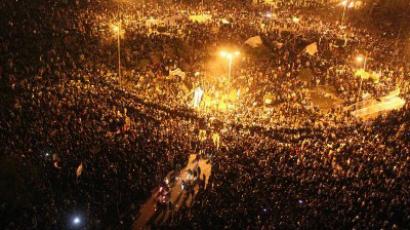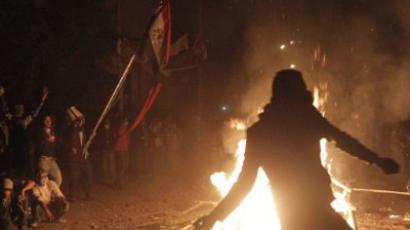Egypt protests: military warn of ‘extremely grave consequences’
No-one will be allowed to pressure the armed forces, the head of Egypt’s Supreme Council has warned, as he asked political leaders to support new PM Kamal al-Ganzuri. His comments came amid mass protests demanding an end to military rule.
"We are faced with enormous challenges,” Field Marshal Hussein Tantawi told reporters on Sunday. “We will not allow troublemakers to meddle in the elections, and we will not allow any individual or party to pressure the armed forces,” he declared in a robust statement. He has also asked two possible presidential candidates, the former head of the UN nuclear watchdog, Mohamed ElBaradei, and ex-Arab League chief Amr Mussa, to “support the government of Kamal al-Ganzuri.”Tantawi warned of “extremely grave” consequences if the nation does not pull through its current crisis, and urged voters to turn out for the parliamentary elections starting on Monday.However, people gathering on Tahrir Square for a fresh wave of protests against Egypt's ruling military council do not share Tantawi’s optimism about the elections or the probity of the country’s military rulers. Tantawi is facing mounting pressure to step down immediately, along with his fellow generals on the ruling military council, to make way for a civilian presidential council and a “national salvation” government to run the nation's affairs until a president is elected."The people calling for the elections are mistaken; how can we hold elections when protests continue and the country is in chaos?” asked Wajeeh Abdul Salam, a protester in Tahrir Square. “The military council has engineered the issue of elections so the people are distracted from its mistakes.This just proves they've failed in the administration and running of the country over the past months," he added. The vote is now seen by many activists as serving the military's efforts to project an image as true democrats and the nation's saviours. Another protester, Armani Salaha, is calling for the military council to return “to their barracks and start protecting the country." He says the military have “demonstrated they are incapable of leading the country over the last nine months.”The next parliament is expected to be dominated by the country's most organized group, the Muslim Brotherhood, who decided to boycott the ongoing protests to keep from doing anything that could derail the poll.However, the outcome of the vote is likely to be seen as flawed given the growing unrest and the suspension by many candidates of their campaigns in solidarity with the protesters.
The Muslim Brotherhood, which advocates Islamic reforms and a democratic system, but which has a history of terrorist violence and has been branded an extremist movement by some countries, claims it is set to win the majority of seats. Political analyst Dr. Marcus Papadopoulos says if the Muslim Brotherhood comes to power, it may lead to a new Libya-like conflict with the West. ”If the people vote them in you could see in a few years time NATO or the British and Western press talking about how awful the regime is there, how dangerous it is, and then you are back to a situation where there is discussion about NATO air strikes against Egypt.”
The latest protests on Tahrir Square have been going on for over a week, with 42 people killed and more than 2,000 wounded. Well over 100,000 gathered in downtown Cairo for a ninth day on Sunday demanding the ruling military leadership steps down in favor of a civilian presidential council.
The majority of Egyptians will go and vote in the first elections after the revolution, predicts Dr. Ahmed Abu Alwafa, Chief of Public International Law at Cairo University, sharing his perspective on the upcoming parliamentary elections in Egypt.It's an increasingly unstable time in Egypt and it seems Monday's parliamentary election threatens to split Egyptians even further: Some call for a boycott of the vote, others, like the Muslim Brotherhood, now encouraging people to go to the polls.The Muslim Brotherhood has high hopes for the election and polls suggest they could win up to 40 per cent of the seats. The west considers the Brotherhood a terrorist organization, but not the Egyptian people, Dr. Ahmed Abu Alwafa says.If the Muslim Brotherhood comes to power, it will not violate any international agreements, with Israel for example, because “it is fundamental for Islamic law to carry out treaties and honor them,” – if the other party fulfills its part.When the revolution kicked off in January, the Muslim Brotherhood played a pivotal role in organizing the protests. Now, the Muslim Brotherhood does not participate in protests anymore because they do not want to deteriorate relations with the military in power, calling supporters to come and vote.“Political dealings are to be held in the interests of the Egyptian people and if the Muslim Brotherhood wins this election – they will try to nominate a [leader] person accepted by them, to carry out their aspirations and programme. If they see that the former IAEA chief Mohamed El Baradei is the right person – they will nominate him,” argues Dr. Ahmed Abu Alwafa.














